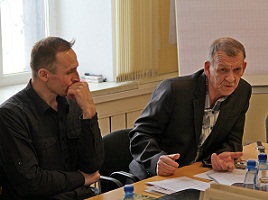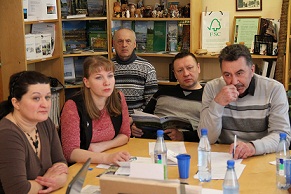On Interregional Cooperation and Recreational Fishing on the Mezen
Interregional cooperation and recreational fishing on the Mezen was discussed at another meeting of the “Model river Mezen” project Working group held at the end of February.
Yury Pautov, “Silver Taiga” Director and member of the Working group engaged in the development of this document, informed the audience about the progress of implementation of the project initiative on creation of an interregional target program aimed at conservation and reproduction of the Atlantic salmon in the Mezen river. He introduced the audience to the main sections of the Program under development.
 One of the obligatory Program conditions is collaboration of the interested partners from Komi and Arkhangelsk region – and by now this collaboration has already been launched within the frameworks of the “Model river Mezen” project. The next Program section will offer the options for optimization of the fish protection on the Mezen, which will be selected based on the analysis of the problems hindering the efficient protection activity at the moment. Besides, the role of the specially protected natural areas existing in the Mezen river-basin in terms of aquatic bioresources protection will be analyzed and options for creation of a fishery conservation area will be considered.
One of the obligatory Program conditions is collaboration of the interested partners from Komi and Arkhangelsk region – and by now this collaboration has already been launched within the frameworks of the “Model river Mezen” project. The next Program section will offer the options for optimization of the fish protection on the Mezen, which will be selected based on the analysis of the problems hindering the efficient protection activity at the moment. Besides, the role of the specially protected natural areas existing in the Mezen river-basin in terms of aquatic bioresources protection will be analyzed and options for creation of a fishery conservation area will be considered.
One more Program section covers an analysis of the activity ongoing on the fishing grounds (FG) provided for use and determination of the common approaches to the FG formation.
The important Program sections include an assessment of the extent of the illegal Atlantic salmon fishing along the entire length of the river, from the mouth to the head, as well as preparation of the proposals on adaptation of the legal framework and fishing rules in the Mezen basin with account of the NGOs and citizens’ opinion.
The activities on an artificial reproduction and stocking of the river with different species of aquatic bioresources and recommendations on organization of the public control will be also suggested in the Program. A special section is devoted to the interregional applied researches aimed at the estimate of abundance, reproduction, and stock management of the Atlantic salmon in the Mezen basin.
 It is worth noting that the Program is still developed by the interregional Working group and hasn’t been granted a status of an official document signed by the heads of the constituent entities of the RF yet. However, in parallel, the practical work has already been started. For example, the first joint conference of the stakeholders has recently been held in the Leshukonsky district of the Arkhangelsk region. One more practical step is the following: in the 2014 season the specialists will organize joint activities on the downstream migrating juvenile fish inventory in the Mezen. The required funds have been allocated by the Arkhangelsk region and the Komi Republic. Such investigations have not been conducted by the ichthyologists over the past few decades. Even if the PINRO ecologists have carried out any works, they have been conducted in the sea.
It is worth noting that the Program is still developed by the interregional Working group and hasn’t been granted a status of an official document signed by the heads of the constituent entities of the RF yet. However, in parallel, the practical work has already been started. For example, the first joint conference of the stakeholders has recently been held in the Leshukonsky district of the Arkhangelsk region. One more practical step is the following: in the 2014 season the specialists will organize joint activities on the downstream migrating juvenile fish inventory in the Mezen. The required funds have been allocated by the Arkhangelsk region and the Komi Republic. Such investigations have not been conducted by the ichthyologists over the past few decades. Even if the PINRO ecologists have carried out any works, they have been conducted in the sea.
Another topic which has also been addressed at the February meeting of the “Model river Mezen” project Working group was the development of the recreational fishing on the Mezen. Advantages and disadvantages, success and problems of this type of activity have been considered through specific examples from the practical experience of the fishing grounds in the Leshukonsky district of the Arkhangelsk region and Ust-Kulom district of the Komi Republic. The entrepreneurs – a member of the project Working group Igor Korbut from the Leshukonsky district and Marina Gicheva (fishing grounds on lake Kadam in the Ust-Kulom district) have shared their experience and proposals with the audience.
The Working group has also discussed the issues related to the organization of an interregional conference in the Leshukonsky district – objectives of the event, role and participation of the Working group members and representatives of all other stakeholders.
Valentina Semyashkina
The photo was made by Nikolay Shuktomov
Translated by Irina Sokolova
